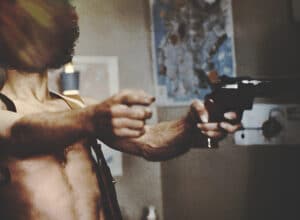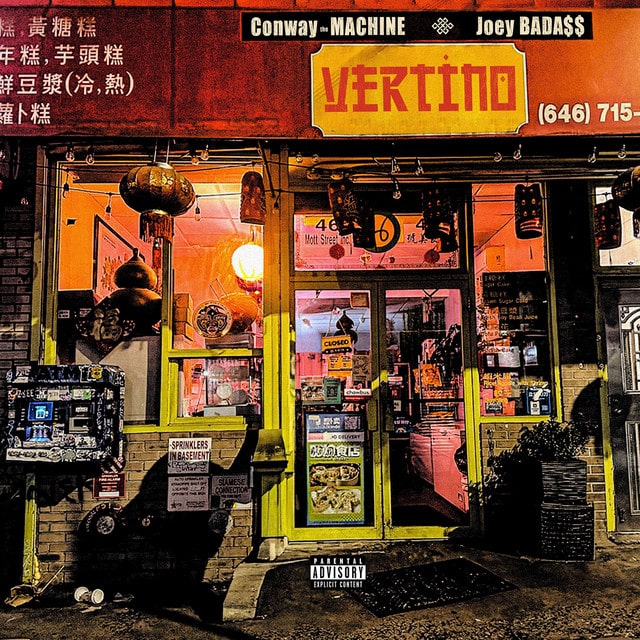Released: 2018
Conway the Machine’s song “Devil’s Work” delves into themes of street life, resilience, and personal transformation. The track illustrates his gritty upbringing and his unyielding journey through adversity, marked by violence and survival. He also asserts his position in the rap game, showcasing his lyrical prowess and staking his claim as one of the genre’s finest talents.
The hook of the song immediately draws you in with the trademark ad-lib “Griselda by Fashion Rebels,” setting the stage for a narrative rooted in raw authenticity. It sets the tone for the entire piece, providing an almost cinematic introduction to Conway’s street-centric perspective. Griselda, the collective Conway is part of, is known for its vivid storytelling and rugged sound, which is reflected throughout the song.
The opening verse vividly describes the harsh realities of Conway’s environment, highlighting contradictions in behavior when people portray a facade of toughness. “Niggas talkin’ gangsta, I see ’em, they sing a different tune,” exposes the inauthenticity of those who pretend to live the street life. He then describes an act of extreme violence, “Fifth’ll boom, blow his head outta space ’til it hit the moon,” signifying both the hyperbolic violence and chaos surrounding his upbringing.

Conway’s past is starkly illustrated when he reflects on the personal impact of addiction and imprisonment: “Seen my man mama puttin’ the lighter to a dinner spoon,” refers to the all-too-common sight of heroin use. He talks about visiting friends in prison, painting a picture of enduring relationships through difficult circumstances, “My man been locked for years, it’ll be ten in June.” The lyric “He said, ‘My nigga, I ain’t trippin’ that setback was minuscule'” shows a stoic acceptance of such realities, reflecting a deep-seated resilience.
Throughout the song, Conway the Machine asserts his confidence and capability as an artist. “All these niggas droppin’ tapes, nobody’s shit was ill as mine” speaks to his belief in his superior artistry, further amplified by his boasts of wealth and status with lines like “Benz colored clementine” and “more Jordans than Melo.” This self-assured narrative threads throughout his verse, demonstrating his relentless drive and ambition.
There’s a layer of critical self-awareness too, as Conway questions his place among hip-hop legends, yet seems confident that he’s “considered one of the illest.” Despite any lists that might omit him, he affirms his place in the rap hierarchy with lines that express slight annoyance, yet acceptance of the recognition by “legends” of his craft.
His verses are rich with the gritty imagery of street life—references to “hoppin’ them fences” and “clip in my Glock was extended” evoke the dangers and vigilance needed to survive his world. He nods to the aesthetics of street credibility and the costly nature of his style, “This shit that I rock is expensive,” indicating his evolution from struggle to success.
The personal reflection in “how I got shot in that Hospital in intensive” gives the song a profound emotional depth. This harrowing memory signifies not only physical survival but metaphorically represents overcoming life-threatening adversities to reach his current status. It’s an honest reflection that many can find relatable in different contexts of struggle and recovery.
In the outro, Conway emphasizes a defiant independence in choosing his collaborations, “Won’t do no features with you, unless it’s beneficial,” which signifies his selective nature and the high standards he holds for his craft and partnerships. He reinforces his legitimacy in the streets with, “I’ve been official,” pointing to his consistent authenticity and respect in the industry.
“Devil’s Work” closes with a satirical, almost theatrical religious invocation, flipping the notion of repentance and divine blessing. The ending’s dialogue satirically implies a rebuke of conventional morality, “I am the Devil, and I am here to do the Devil’s work,” encapsulating Conway’s embrace of his complex persona, rooted in a world where survival sometimes demands moral flexibility. Through these elements, Conway effectively melds personal history with artistic mastery, making this track both a testimony and a showcase of his resilience and skills.








